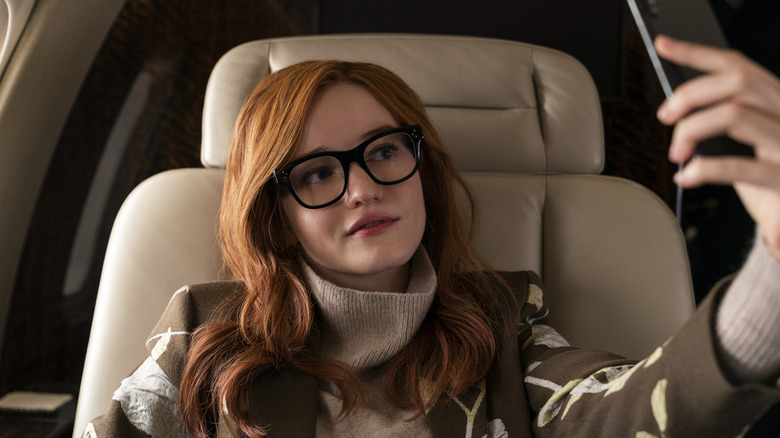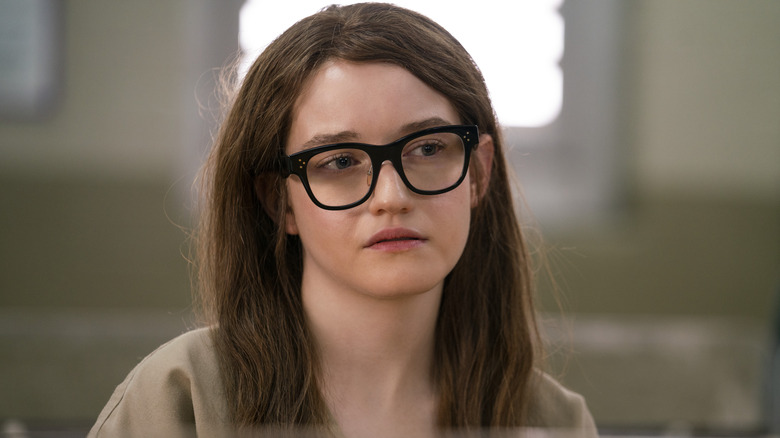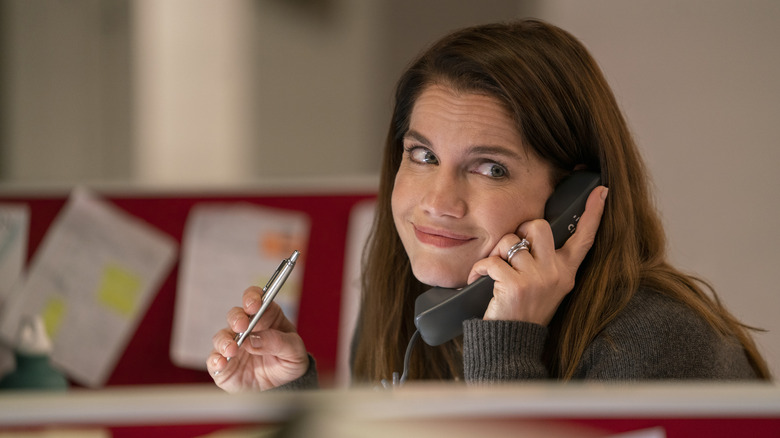Inventing Anna Review: This Frustrating Mess Is Too Enamored With Its Main Subject
Anna Delvey is not a hero. Such a statement should be common sense at this point, but you wouldn't think so watching "Inventing Anna," the Shonda Rhimes-created Netflix series that turns the con artist into the ultimate #girlboss. Time and time again this wrongheaded series seems to shout, "Sure, Anna is a nasty, superficial person who steals from people — but she's got style!" It's one thing to have empathy for a flawed protagonist. It's another thing to paint that protagonist as someone worth celebrating.
I'm a big proponent of the concept of "depiction does not equal endorsement." That is, just because a film or TV show is portraying a character in a certain way it doesn't mean the show itself is sympathetic to their actions. Martin Scorsese movies often (wrongly) succumb to this criticism, and as I watched "Inventing Anna," I couldn't help but think of Scorsese's fantastic "The Wolf of Wall Street." In telling the true-ish story of criminal stockbroker Jordan Belfort, Scorsese created a world of excess and extremely dark comedy. The end result was a film equally hilarious and disturbing, but some viewers seemed to only notice the "hilarious" part. As a result, many felt that Scorsese was glorifying Belfort's actions. But to do so would require overlooking the many instances Scorsese provides of Belfort and those around him behaving like amoral psychos. There's literally a scene where the guy punches his wife in the stomach and then immediately crashes his car with his infant child in the backseat for crying out loud.
"Inventing Anna" could've gone for a "Wolf of Wall Street"-like approach and painted the Delvey story as a darkly comedic but still misguided tale. Instead, Rhimes continually tips the scales in Delvey's favor, going so far as to give us a scene where a group of journalists — whom we're meant to like and see as very smart people who know the whole story — literally cheer for the fraudster during her trial. Multiple characters make a point of highlighting the fact that Anna, as a young woman, had to fight harder for success than a man in her situation. And I have no doubt that's true. But that doesn't mean we should root for her. I'm not saying "Inventing Anna" should've portrayed Delvey as some sort of inhuman monster — a show like this should try to give us a more complex portrait of its flawed central figure. But by the time the last episode of "Inventing Anna" cuts to black, you can't shake the distinct impression that "Inventing Anna" is less a portrait of a troubled character and more akin to a show-length adaptation of a novelty T-shirt that reads ANNA DELVEY DID NOTHING WRONG in big block letters.
How Anna Delvey Tricked New York's Party People
In case you missed the story when it broke and lead to all sorts of infamous shenanigans, Delvey (real name Anna Sorokin) is a Russian-born German who posed as a wealthy heiress in New York City. Between 2013 and 2017, Delvey was able to con her way into the world of the rich and famous, defrauding banks, hotels, and people who thought she was a friend along the way. New York Magazine (which is rebranded as "Manhattan" Magazine for the show while still using the "New York" font) reporter Jessica Pressler eventually got ahold of the story and wrote a story on the whole affair, titled "How Anna Delvey Tricked New York's Party People."
Here, Pressler has been fictionalized as a character named Vivian, played by Anna Chlumsky, delivering a performance that might best be described as "over-caffeinated." Vivian, who is pregnant with her first child throughout much of the show, was once a hot-shot young journalist — but a story went bad on her, and now she's been stuck in the back corner of the newsroom dubbed "Scriberia" (You know, like Siberia, but with Scribe? Ho ho, it's supposed to be funny). Here, she's surrounded by other less-than-stellar journalists, all of whom act as a kind of Greek Chorus, guiding Vivian along and helping her bang out the story.
Vivian's investigation leads her to meet with the recently arrested Anna, played by Julia Garner. Garner, who nails the real Delvey's aloofness and distinct accent, is the one bright spot here — her performance is genuinely great, and it's a damn shame she wasn't given a better opportunity to showcase what she's doing here. The meeting with Anna doesn't go so well — the faux heiress immediately insults how Vivian is dressed and her pregnancy weight. Such a rude initial encounter might turn others off, but Vivian is clearly enamored with Delvey and thinks that this story might be her personal ticket out of Scriberia.
Since there's clearly some unspoken law somewhere that all new TV shows must begin in medias res now, "Inventing Anna" throws all of this at us from the start and then works backward, filling us in on Anna's life and crimes. Along the way, Vivian interviews the people who knew Anna, including personal trainer Kacy Duke (Laverne Cox) who now realizes Anna is bad news, and hotel concierge Neff (Alexis Floyd), who refuses to give up on Anna. The Neff character is endlessly frustrating, sticking by Anna over and over again. It doesn't help that the script requires her to constantly talk as if she's firing off gotcha tweets rather than speak like a normal individual. I have no doubt the real Anna had loyal friends like this, but time and time again, "Inventing Anna" gives us the impression that Neff is right to defend Anna, and everyone else who turned on the fake heiress is a two-faced betrayer.
Fashion Sense
The central argument of "Inventing Anna" seems to be that since the majority of the people and institutions Anna ripped off were already wealthy, there was no real harm. Look — I have no sympathy for the uber-rich. There is a crushing amount of economic inequality built into this country, and I have no objections to taking the obscenely well-off down a peg or two. But that doesn't mean Anna was innocent. On top of that, not all of Anna's victims were among high society. Take Rachel DeLoache Williams, played here Katie Lowes. Williams worked in the photo department of "Vanity Fair" and befriended Delvey via social media. The friendship led to a trip to Marrakesh — where Delvey proceeded to reveal she didn't have access to her alleged fortune and couldn't pay the bill. Williams stepped in, putting the $62,000 bill on her work credit card under the assumption that Anna — who, again, was supposed to be rich and famous — would pay her back immediately.
Instead, Delvey ghosted Williams for months, and when the two women finally met again face to face to discuss the money, Delvey accused Williams of being the greedy one and stormed out. You can make a case that Williams was naive, but can you really blame her for believing Anna was as rich as she claimed to be? Anna's entire lifestyle was devoted to making those around her think she was wealthy — why should others be punished for believing her lies? The show wants to make the argument that Williams was only interested in Anna for her money, but even if you want to believe that's true, does that make Anna scamming $62,000 from someone who didn't have that kind of money just sitting around a-okay? "Inventing Anna" seems to think so.
A repetitiveness begins to set in. Vivian will interview one person after another, learn terrible stuff about Anna, and then ultimately defend her. People around her, like her husband (Anders Holm), will try to point out that Anna is bad news; even a sociopath, perhaps. And Vivian will quickly shut them down, saying that they just don't get it. It would be one thing if "Inventing Anna" was trying to show us that Anna is such a good con artist that she's able to fool even the journalist investigating her. But it truly doesn't feel that way. Instead, "Inventing Anna" wants us in Anna's corner, even after illustrating that being anywhere near Anna Delvey would probably lead to ruin and disaster. Eventually, the trial arrives, and Anna's true superficial nature continues to shine through: She refuses to go into court unless she's allowed to wear stylish clothes. And how do the other characters react to this? They cheer.
With a chaotic editing style and a series of performances that are so over-the-top they border on hysterics (again, Garner is the only performer here who seems to have a grasp on their character), "Inventing Anna" is slick and broad enough that those looking for something lurid and tabloid-esque will probably get a kick out of it all. But it left me cold. Day after day it seems like one morally bankrupt scam artist after another rises to prominence, ruining lives in the process. Do we really need to start celebrating these people just because they have a good fashion sense?
"Inventing Anna" is streaming on Netflix on February 11, 2022.


